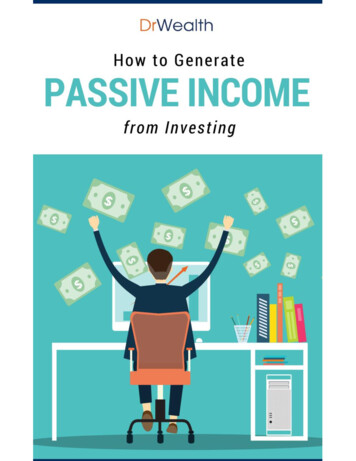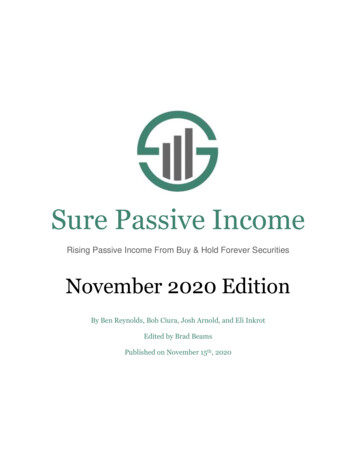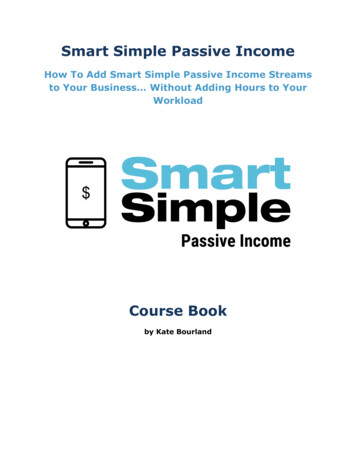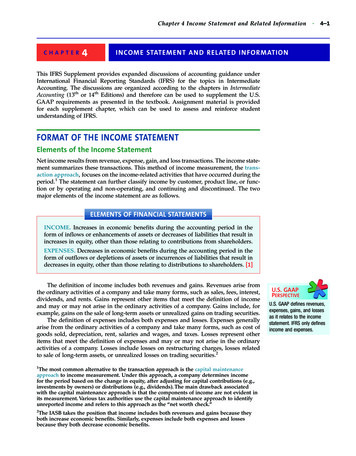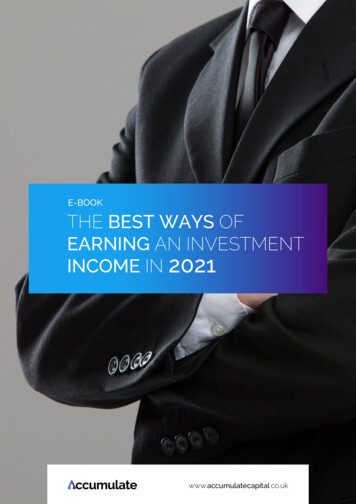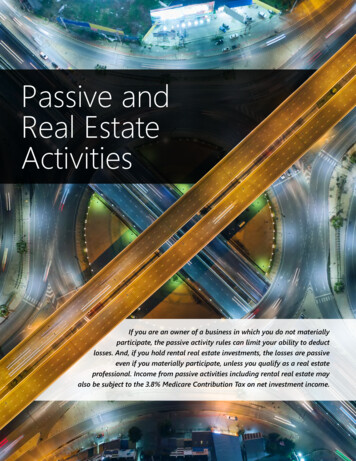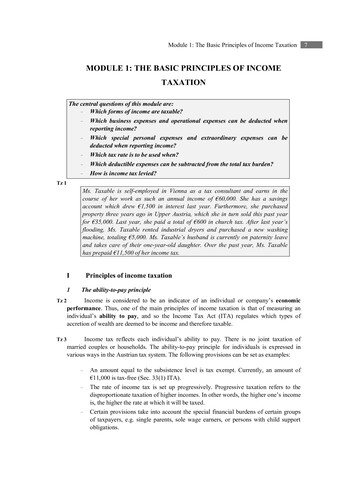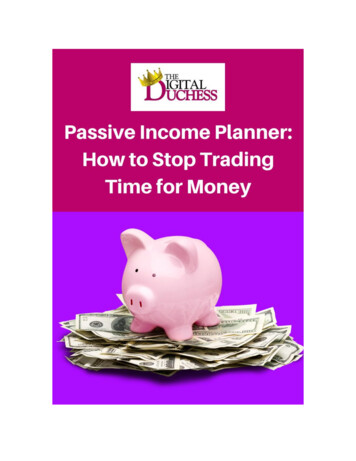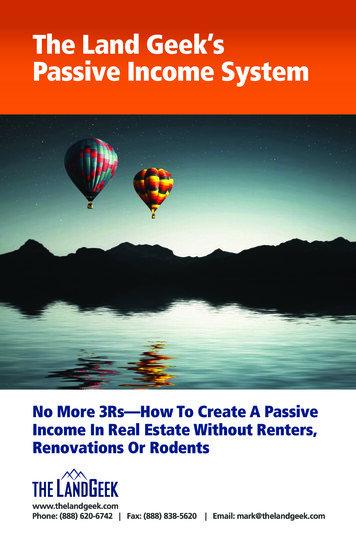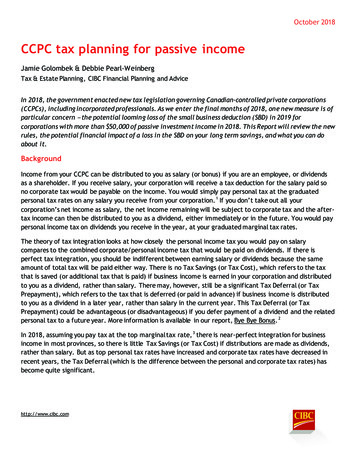
Transcription
FREE REPORT: EDUCATIONAL RESOURCE3 PASSIVE OR SEMIPASSIVE WAYS TOPARTICIPATE IN THECURRENT REAL ESTATEMARKET
Recently in an interview with famous investorand entrepreneur Warren Buffet at his Omahaheadquarters, a CNBC reporter asked himwhat he’d suggest people invest in today’smarket.Mr. Buffet answered back by saying, “ I’d buya couple hundred thousand single familyhomes if I could”. His reasons for this arebecause of the still great historical buyingprices and the low interest rates.Here’s the entire video interview if you’dlike to check it out (well worth a listen):http://www.cnbc.com/id/46538421Figure 1: Warren Buffet says in an recent CNBCinterview he's buy "a couple hundred thousandhouses if he could", based on several factors.Just like Mr. Buffet, many people want toparticipate in this great buyers market togrow their investment portfolio, but if younotice in the interview he say’s “butmanaging the rentals is the hard part”.In essence he’s saying, “I want the result the investment gives me but I don’t want todo the day to day work that these types of investments require”, which includesmanagement of the properties, finding and sourcing the deals, negotiation, sellingthe properties, and on and on.If you feel the same way, you’re the type of person we compiled this educationalreport for. The investor who wants to tap into and participate in this real estatemarket but wants to take a more passive role.Before we dive in we should probably define “passive investing” so we’re all on thesame page.What Is Passive InvestingDefined As?Passive Investing is defined as: “An investment strategy involving limited ongoingbuying and selling actions. Passive investors will purchase investments with theintention of long-term appreciation and limited maintenance. “page 2
Read vesting.asp#ixzz1qH1KforMSo, in this report we’ll be discussing ways people are participating in the current realestate market with limited ongoing buying and selling actions and for the long-termgrowth of ones funds no quick hits here.One last note before we dive in. As you know, just like most investments, realestate is not a guaranteed investment. In fact, it’s far from it. Many people gotcaught unprepared in the 2008 real estate bust and lost their life savings. However,many who educated themselves on the real estate market, made smart decisions,and aligned with great advisors, gained a lot of wealth in the years since the bust and continue to do so today.So, when you’re reading this report know that all real estate investments come withrisk, sometimes significant risk, and you need to take any decision in investing inreal estate seriously and get advice from professionals who you trust before you gointo any investment.Sound good? Excellent.The 3 Ways To Passively OrSemi-Passively Participatein The Real Estate MarketReal estate is one asset class that will be around forever. There will always beproperty. People will always need to have a place to live, work, shop, and someonehas to help provide them with that.When most people think of “investing in real estate” they’re usually thinking ofbuying real estate and either holding onto it for a rental or “fixing and flipping” it toan end buyer for a profit.There are many other ways to invest in real estate than that including Wholesaling real estate (sourcing properties and selling them to otherinvestors) Developing real estate (commercial, office, residential housing, etc.) Purchasing notes and other variations of those.page 3
In the end, real estate can be a great vehicle to gain wealth and diversify yourportfolio away from more traditional investments like stocks.But, one thing you’ve probably already caught on to is most real estate investingstrategies require your time, your expertise, and your knowledge to make stuffhappen. In short, they’re a business.So how do you get in on this real estate market but in more of a passive way thatgenerates returns and/or profits without you actively going out there and finding thedeals yourself?Here are 3 effective ways many people are participating in the real estate market inpassive or semi-passive ways.Purchasing “Turn Key”Properties For LongTerm RentalMany people in great buyers marketswant to stock up on rental propertiesfor the semi-passive recurring revenuerental properties can generate.You’ll notice I said “semi-passive” here.The reason I say this is because owningrental properties can be a lot of work ifyou’re taking on the management ofthose properties yourself. So,depending on your rental property strategy, you can be as passive or active in theinvestment as you want to.“Turn Key” rental properties are often purchased from real estate investment firmswho specialize in acquiring properties below value, bringing them up to rental shape,then bringing in their recommended property management firms to take care of theproperties from there.Often times these types of investments can be extremely passive if you’re purchasingfrom a reputable and honest real estate investment firm. I personally know peoplewho have bought multiple properties from the same real estate investment firm andthose properties return positive cash-flow each and every month for them with littleor no involvement from them on the day to day management of those properties.page 4
Some great things about “turn key” properties are that you walk right into a propertythat is ready to go and often times already have paying tenants in them. You bringin the cash and purchase the property from the real estate investment firm, and aslong as the property management firm does their job, you have a low maintenanceinvestment.Some things that can be bad are the obvious ones that come with owning rentalproperties. The potential liability you have as the “landlord” if something happensto a tenant, if tenants don’t pay you have to deal with evictions and lost rents,property values could potentially decrease, repairs and expenses with the property,etc.All in all, finding Turn Key rental properties can be a great long-term investmentstrategy if you’re willing to put up with everything that comes with owning rentalproperties. If you buy right, have a great property management team helping you,and your properties are in great areas that are increasing in value they can be aGREAT way to get into this real estate market without having to go out and find theproperties yourself.In fact, often times real estate investment firms who specialize in “turn key” rentalproperties can look for exactly what you’re looking for, in the areas you want to buy,at the budget you want to pay. So, figure out your goals first, then seek out areputable real estate investment firm and ask how their “turn key” rental propertyprogram works.Private Lending OnReal EstatePrivate lending has been aroundseemingly forever, but isprobably the least well-knownway that people are participatingin the real estate market todiversify their portfolios.Private lending is simply aperson acting as the bank forthe person or company who isbuying/investing in theproperty. Rather than going to a bank to get the funds to purchase the property,many real estate investment firms go direct to individuals who have investmentpage 5
funds they’d like to diversify (we’ll call them private lenders from here on out) andthe private lender lends the money to the real estate firm to close on the property inexchange for a rate of return on the loan / investment.This is how banks operate each and every day and private lending is actually rathercommon in every real estate market around the country. They make their profits bycharging an interest rate to the person borrowing the funds. The interest ratecharged often is higher as the investment risk goes up.As a private lender, they get to choose the loans they make, the interest rates andterms they pay, and have a lot of flexibility with how the transaction is structured.There really is no “average” rate of return that private lenders can earn; however,we’ve found that 5% - 9% tends to be around what many private lenders earn on theirfunds.Many private lenders will carve out a portion of their overall portfolio that they thendedicate to private loans to real estate investment firms and will continually reinvestthose funds in new loans as old transactions are paid off.The best way for someone to get involved in private lending is to network in yourarea and get to know local real estate investors that have great reputations forhonesty and integrity, who have a proven track record of delivering on theirpromises, and who can have other investors or vendors vouch for them.Some things that many people see as negatives to private lending are that it can be arather risky type of investment if the deals aren’t evaluated on a strict set of criteria.But, in the end, private lending isn’t a complicated type of investment. Thetransactions should be based on the property and not necessarily the borrower, andthe property should act as the main collateral for the investment in case it should gosouth. Many people do extremely well as private lenders and have relatively low riskoutlaid when they’re working with the right real estate investment firms.NOTE: If you’d like to learn more about private lending and how it works,we’ve created a very detailed and step-by-step educational report that walksyou through private lending, how it works, risks, rewards, and more. If you’dlike a copy of this Free Report just contact us and we’ll get it over to you.Investing as a private lender on real estate can be a very passive investment andprivate lenders can enjoy really great returns especially if they’re able to do shorterterm loans where their money is “churned” multiple times a year.For instance, lets say a private lender lends 100,000 at 6% for the loan term of 6months. That means that the loan will be paid back within 6 months and will yield 6,000 in interest payments plus of course the principal. If the private lender wasable to reinvest / re-loan that 100,000 immediately on another real estate deal withpage 6
the same terms, they’d earn another 6,000, resulting in a 12,000 interest profit or approx. 12% annual rate of return on those funds.Or, many private lenders will loan based on an annual percentage yield (APY). Asanother example, if the same private lender on the same deal decided to loan the 100,000 at 7% APY for those 6 months they’d earn 3,500 in interest overthose 6 months. For many private lenders this is a great way to create passive orsemi-passive revenue streams with their investment funds just by teaming withreputable real estate investment firms as a private lender. The real estate firm doesall of the work on sourcing the deal and making it happen the private lendersimply puts up the funds required to make the deal happen and earns a rate ofreturn in the process.If the real estate firm defaults on the private loan, the lender would be able toforeclose on the property just like a bank would, take ownership to the property, andthen could choose what they’d like to do with that property (keep it and rent it, sell itand keep any profits or potential losses if the property wasn’t purchased at a goodenough deal, etc.).Equity Partnerships With Active InvestorsAs investors get more-savvy in the real estate investment world many choose to getmore involved in deals and may choose to partner on deals rather than just be thelender.Often times the returns when partnering on deals can be greater, but it also requiresmore risk be taken on by the investor and many times more work as well. So, beingan equity cash partner for real estate deals can be a great way for many people toparticipate in the real estate market, share in the profits on deals, but not have totake on the full workload of sourcing properties, negotiating the deals, and takingcare of the deal details after purchase.Some investors who choose to be the cash partner on real estate deals choose totake a more active role others take a more passive role. The choice is yours as theinvestor and should be based on your own knowledge and resources that you canbring to the table for each particular real estate deal.In our experience, usually people who choose to take on equity roles in real estatedeals as the cash investor tend to have experience in real estate and many times gettheir feet wet as a private lender or active real estate investor themselves first. Butthis isn’t always the case.So, if you have knowledge in real estate investing and can evaluate a good deal whenyou see one and in exchange for a bigger cut of the deal are willing to do a bit morepage 7
of the work and take on a bit more risk finding equity partnerships with reputablereal estate investment firms may be a great option to look into.The same goes here if you’re interested in seeing if there are opportunitiesavailable in your area to invest as an equity cash partner into real estate deals dosome networking and find a few reputable real estate investment companies that youcan get to know and learn more about. Then, once you feel comfortable see if thereare opportunities to invest in their deals as an equity partner sharing both the risksand the rewards.This type of participation in the real estate market can be a more active role thanprivate lending and often requires more cash into the deals but not always. Thiscan be a really great route for those with a bit more risk tolerance, who don’t mindbeing a bit more active in the deals, and who come in with some knowledge in thereal estate world so you can evaluate the deals well yourself.Summing It All UpIn the end real estate can be a great investment vehicle for the right person. Makesure to consult with your own professional advisors to see if participating in realestate will help you reach your goals.Many people love to take the active role in real estate investing and have theexpertise in finding great properties, negotiating great deals, fixing and managingproperties, and everything else that goes with actively doing real estate deals.However, many people don’t want to take an active role in the actual real estate dealsand would rather just let their money do the work for them. These types of peopletend to like the passive or semi-passive routes to participate in the real estatemarket that we’ve mentioned in this free report.The best way to learn more about any of these ways to participate in the current realestate buyers market is to contact a few local reputable real estate investmentcompanies in your area. Get to learn about their business, understand what they do,talk to people they’ve worked with in the past, and make the decision to see ifthey’re a right fit.If you don’t know any real estate investment firms in your area sometimes a greatplace to find the good ones is to visit a title company you trust and ask them whothe most reputable, honest, and active real estate investors are in the area and askfor an introduction. That’ll help filter out some of the riff raff and point you in theright direction or simply ask your friends, family, or advisors if they have anyreferrals. If you’d like, you can contact us as well and we can point you in the rightdirection or you can learn more about our operation and what we do.page 8
Real estate is currently in a huge buyers market still and today can be a great time toparticipate in the real estate market just like Warren Buffet suggested he’d do.There are tons of opportunities out there just educate yourself on the 3 hands offways to participate in the real estate market to see if one or multiples are right foryou then start your search for great real estate investment companies to work with.They’ll do all of the hands-on deal work while you get to leverage your money.If you have any questions about the local real estate market, would like access to ourreal estate reports to help you understand where our local market is, or even havequestions about the information in this report, just contact us through the websiteyou downloaded this report at.Good luck and we hope you enjoyed this free report.- Your local real estate teampage 9
Passive Investing is defined as: “An investment strategy involving limited ongoing buying and selling actions. Passive investors will purchase investments with the intention of long-term appreciation and limited maintenance
